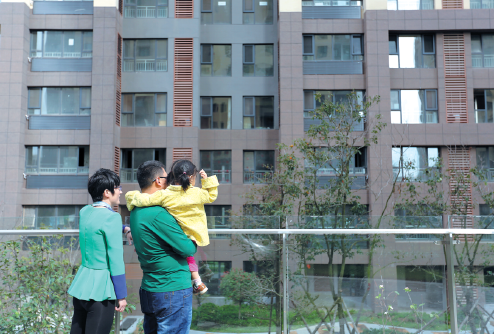Caught in the housing trap
As regulators grapple to keep a lid on soaring housing prices in big cities, some people sign up for the debt treadmill and others decide to just get on with life. Yang Yang reports.
A 2 million yuan millstone hangs around the necks of Wu Jian and his wife, and yet they consider themselves lucky. That amount, equivalent to $290,000, is how much Wu, 28, of Beijing, and his wife owe a bank and their relatives after they borrowed money to buy a 60-square-meter apartment in the city last winter.
If Wu and his wife were on an average salary in Beijing of a little less than 10,000 yuan and each contributed half their pay toward repayments, they would finally discharge their debt by about 2035. However, that calculation ignores any interest they have to pay, which could stretch their burden by quite a few more years.
However, Wu said he feels he had no other choice other than to buy into the Beijing real estate market.
He bought the house because he was getting married, he said, and his wife is now expecting a baby. In fact he had previously not expected to buy a house so early because the deposit, 1.5 million yuan, would usually be far too much for a young couple under the age of 30.
"The baby is due soon, and we wanted to stay in Beijing, so we just had to," he said.
One reason Wu and his wife consider themselves fortunate to have gotten on the real estate escalator is that since they bought their home, housing prices in the capital have continued what seems to be an inexorable rise.
The real estate agent fang.com says the average price of a home in Beijing grew from 56,000 yuan a square meter in October to 63,000 yuan a square meter in March, an increase of 9 percent.
By contrast, Zhilian Recruiting, a China-based website, said that between winter and spring, the average salary in the capital rose from 9,835 yuan to 9,942 yuan, an increase of 1 percent.
What this means is that buying a home in Beijing is increasingly out of the question for many young people unless their parents or even grandparents help them financially, and they borrow from relatives and friends in addition to banks.
Beijing had a population of 21.5 million in 2014, the Beijing Statistics Bureau said, about a third of whom were aged 20 to 34, many of whom attended college at local universities or in other cities. They are some of the most talented people the city has.
Haidian district, in the city's northwest, is often cited as the epitome of the housing affordability problem. The exorbitant prices and continuing increases are driven in large part by parents keen to have their children attend top primary and middle schools in the area to increase their chances of being accepted into top universities such as Peking, Tsinghua and Renmin universities, which are all located in the district.
An anecdote that has recently been doing the rounds tells of a taxi driver and a passenger getting into a conversation about the price of housing, whereupon the driver puts this paradox to his passenger: If graduates from the likes of Peking University and Tsinghua University do not earn enough to be able to afford a house in Haidian, why then bother buying one?
Many of those who have read this account online have given a nod to the taxi driver, and public resignation to the idea that there is no stopping the price rises has given way to bleak pessimism that for young people from middle-class families on just average incomes, homeownership will forever remain a pipe dream.
Wu Nan 28, a journalist, said: "People, especially friends and relatives back in my hometown, use housing as a gauge of your success. If you don't own a home you are regarded as a loser. Added to which, a man like me is disadvantaged in the marriage market."























